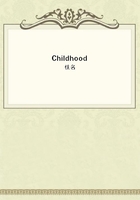
第27章
As she spoke she seemed, to look inquiringly at Woloda and myself, and I confess that I did not feel altogether comfortable.
"Whatever you may say," she went on, "a boy of twelve, or even of fourteen, is still a child and should be whipped as such; but with girls, perhaps, it is another matter."
"How lucky it is that I am not her son!" I thought to myself.
"Oh, very well," said Grandmamma, folding up my verses and replacing them beneath the box (as though, after that exposition of views, the Princess was unworthy of the honour of listening to such a production). "Very well, my dear," she repeated "But please tell me how, in return, you can look for any delicate sensibility from your children?"
Evidently Grandmamma thought this argument unanswerable, for she cut the subject short by adding:
"However, it is a point on which people must follow their own opinions."
The Princess did not choose to reply, but smiled condescendingly, and as though out of indulgence to the strange prejudices of a person whom she only PRETENDED to revere.
"Oh, by the way, pray introduce me to your young people," she went on presently as she threw us another gracious smile.
Thereupon we rose and stood looking at the Princess, without in the least knowing what we ought to do to show that we were being introduced.
"Kiss the Princess's hand," said Papa.
"Well, I hope you will love your old aunt," she said to Woloda, kissing his hair, "even though we are not near relatives. But I value friendship far more than I do degrees of relationship," she added to Grandmamma, who nevertheless, remained hostile, and replied:
"Eh, my dear? Is that what they think of relationships nowadays?"
"Here is my man of the world," put in Papa, indicating Woloda; "and here is my poet," he added as I kissed the small, dry hand of the Princess, with a vivid picture in my mind of that same hand holding a rod and applying it vigorously.
"WHICH one is the poet?" asked the Princess.
"This little one," replied Papa, smiling; "the one with the tuft of hair on his top-knot."
"Why need he bother about my tuft?" I thought to myself as I retired into a corner. "Is there nothing else for him to talk about?"
I had strange ideas on manly beauty. I considered Karl Ivanitch one of the handsomest men in the world, and myself so ugly that I had no need to deceive myself on that point. Therefore any remark on the subject of my exterior offended me extremely. I well remember how, one day after luncheon (I was then six years of age), the talk fell upon my personal appearance, and how Mamma tried to find good features in my face, and said that I had clever eyes and a charming smile; how, nevertheless, when Papa had examined me, and proved the contrary, she was obliged to confess that I was ugly; and how, when the meal was over and I went to pay her my respects, she said as she patted my cheek; "You know, Nicolinka, nobody will ever love you for your face alone, so you must try all the more to be a good and clever boy."
Although these words of hers confirmed in me my conviction that I was not handsome, they also confirmed in me an ambition to be just such a boy as she had indicated. Yet I had my moments of despair at my ugliness, for I thought that no human being with such a large nose, such thick lips, and such small grey eyes as mine could ever hope to attain happiness on this earth. I used to ask God to perform a miracle by changing me into a beauty, and would have given all that I possessed, or ever hoped to possess, to have a handsome face,